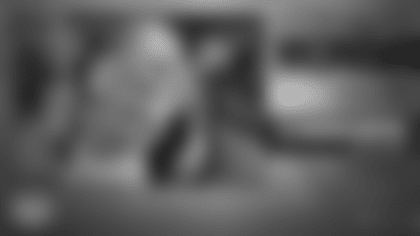General manager Martin Mayhew has seen plenty of drafts in his two decades as an executive, but the 2021 iteration of the NFL's annual event stood out for two reasons: the team had to navigate obstacles presented by COVID-19, and despite that, it pulled it off as well as one could hope.
"This was one of the best processes I've been a part of in my time in the NFL from start to finish [with] the way guys were on top of their responsibilities and areas," Mayhew said. "Everyone that just drafted thinks they had a good draft. We'll find out in a year or two, but we know we got the right kind of people here."
Those results are exactly what the Washington Football Team hoped for when it decided to take the collaborative route for restructuring its front office. The brain trust featuring about a century of experience paid off, and now Washington has 10 players who fit its culture. Just as head coach Ron Rivera anticipated, there was not one dominant voice in the bunch. A throng of executives and scouts contributed on some level, and there is confidence the team strengthened its roster because of it.
"You feel you did it right," Rivera said. "I liked the way we did things, the collaboration that was involved."
It helps that Mayhew did not have to step into a situation with a completely new staff that had never worked together before. Rivera had seen to that the year before by bringing over most of his coaching staff from the Carolina Panthers. Combined with the experience of coaches from the previous regime -- running backs coach Randy Jordan and special teams coordinator Nate Kaczor -- Rivera and his staff spent the past year learning about Washington's roster and determining which areas they needed to address.
Mayhew did not have to decipher that invaluable information alone, either. On top of executive vice president of football/player personnel Marty Hurney, who was hired along with Mayhew to help lead Washington's front office, he could rely on input from senior director of player personnel Eric Stokes and director of college personnel Tim Gribble, who have been with the organization for a combined 21 years, to help get a feel for the team's needs.
"It was very helpful," said Mayhew, who was hired in late January. "We put all those things together, and like I said, the process went very, very well. I'm very excited to see these guys hit the field and start practicing and see how good these guys can be."
But even though Mayhew was armed with decades of council in addition to his own, there was still work to be done with few opportunities to evaluate prospects. The Senior Bowl was played as scheduled, but this year's NFL Scouting Combine was cancelled because of COVID-19, meaning teams would have to rely on each school's Pro Days as the only time to see players on the field.
The team also had to consider the wave of players who decided to opt out of the season because of concerns over the coronavirus. The front office may have liked a player based on his 2019 film, but it was difficult to determine whether they had taken the next steps in their development with little to no current film to dissect.
So Mayhew, Rivera and the front office had to rely on their scouts more than ever as they travelled across the country to Pro Days. They presented their findings to the coaches, who then used that information to give their own evaluations for their respective positions. Given the smaller pool of players in this year's draft, Washington could not afford to be wrong about a player, and from what Rivera and Mayhew could see, the scouts' work was pristine.
"Our scouts have done a great job for us, bringing the information for us, considering they kind of went through a little of what they went through last year, not really getting an opportunity to get inside and get to know the guys like they have in the past," Rivera said. "This year, it's just a smaller pool of guys to work through, so you really get an opportunity to truly dive deep."
There was no greater example of the front office and scouting department working in sync than when Washington considered taking Jamin Davis with its first-round pick. Like everything else the team has done to structure the roster, it came down to a collaborative effort. Scouts went to his Pro Day and saw how impressive the 6-foot-4, 234-pound linebacker was with his 4.47 official 40-yard dash time and 11-foot broad jump. Coaches watched his film and could not help but notice how his performances, which culminated in 102 tackles and three interceptions, kept sticking out to them.
From there, Davis impressed Rivera during their Zoom meetings in terms of football acumen and cultural fit. Then, as Washington's coaches were preparing their final readings, Davis remained high on their list, and by the time the team was on the clock, he was one of its highest-graded defensive player on the board. The months of work executives, coaches and scouts had done made it an easy decision to make Davis their pick.
"Outstanding athlete, explosive, athleticism, 11 foot broad [jump], 42 inch vertical, he's 6'3 1/2", he's over 230 [pounds], he ran under a 4.5 [40-yard dash]," Mayhew said. "All the physical attributes you want, had great production last year -- 100 tackles in 10 games. He checks that box and then he checks the box of being a great football character guy. He fits us, he fits what we're trying to do and he fits our culture."
Mayhew stressed the importance of trusting the draft board -- the embodiment of the team's work -- to dictate the team's decisions for the rest of the weekend. He admitted there were some talks of moving up and down the board; he would bring trade offers to Rivera, and they would discuss the repercussions of those decisions. But the team had conviction in the players it had on the board, and that resulted in Washington picking up Sam Cosmi, Benjamin St-Juste and Dyami Brown on Day 2.
Those players were followed by the likes of John Bates, Darrick Forrest and Shaka Toney. Outside of one trade, which resulted in Washington actually adding two picks to its Day 3 haul, Washington stood pat with its draft capital.
"That's where your area guys and your scouts make their money," Mayhew said on mid-round selections. "It's locating those guys that are not necessarily top tier, first-round picks, but have a skillset that allows them to excel at this level."
Drafts are never a certainty, even with the best research, but Washington can head into the rest of the offseason feeling positive it has picked the right players to bolster its roster. Rivera wanted to have as many experienced voices as possible contributing to the team's decisions, and that has bore bountiful fruit in the form of a draft class that has been applauded by draft pundits.
It can be hard to quantify results in the offseason, but it is clear Washington deserves another "W" for its front office approach.
"I felt great about the process from start to finish," Mayhew said. "It was a collaborative effort from everybody and it came together very nicely."










